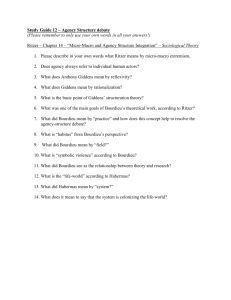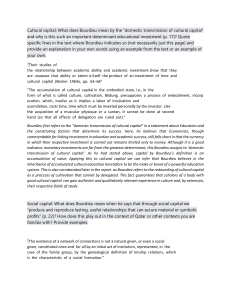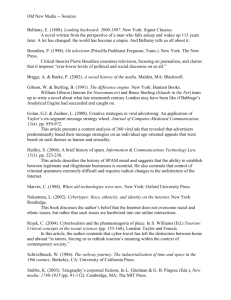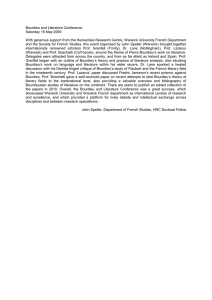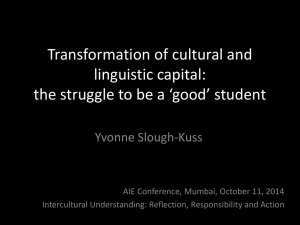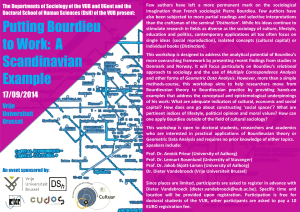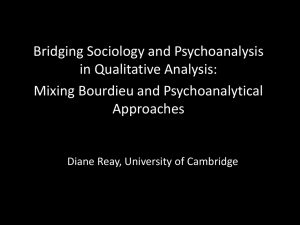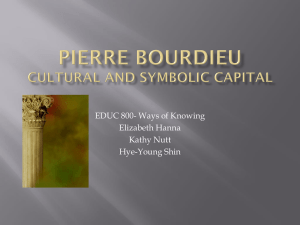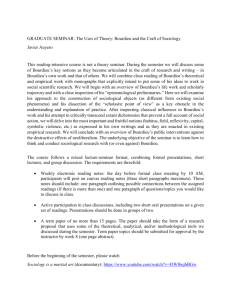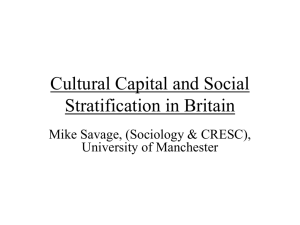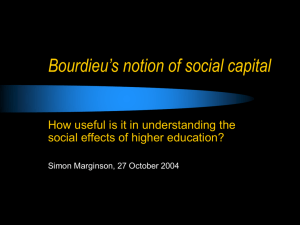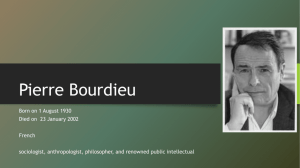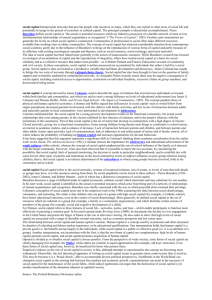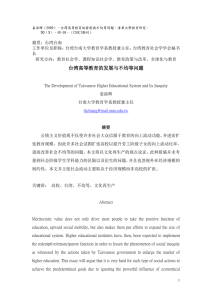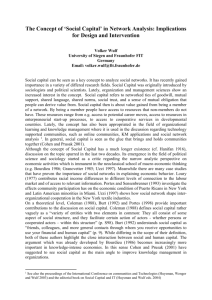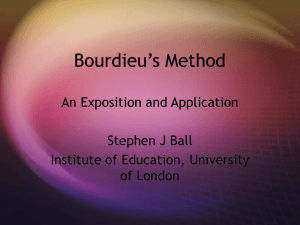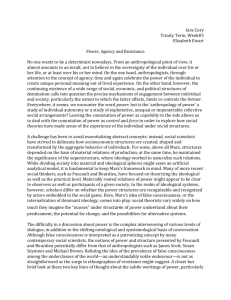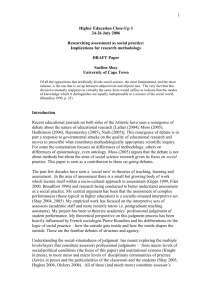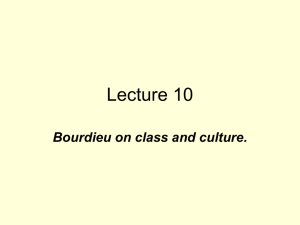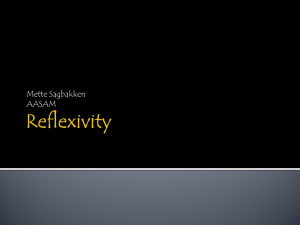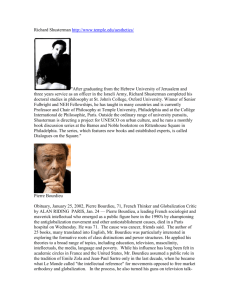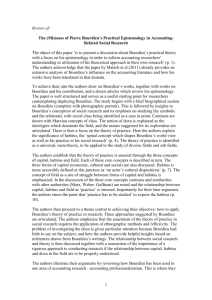Why a theory-driven approach?
advertisement
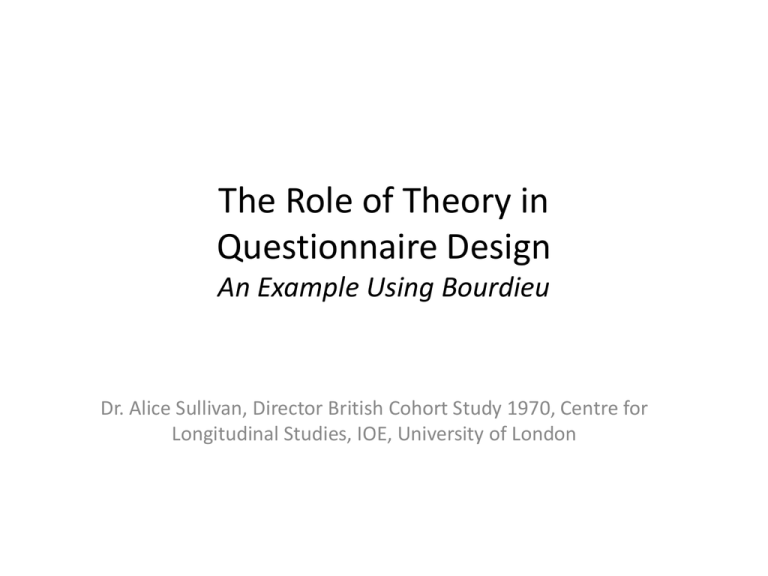
The Role of Theory in Questionnaire Design An Example Using Bourdieu Dr. Alice Sullivan, Director British Cohort Study 1970, Centre for Longitudinal Studies, IOE, University of London Outline • Uses of theory in research • Bourdieu’s theory of cultural reproduction • Developing a questionnaire to measure cultural capital Carrying out original survey work Pros and Cons • Hard work and smaller sample size • Allows conceptual work, developing measures rather than using proxies What is theory? Picture Map What is theory? Post-hoc story telling Theory as embellishment Assessing theory • Clarity: is it comprehensible? • Substance/Testability: does it have any implications? • Insight: does it help to explain interesting phenomena? • Usefulness: does it help to generate and guide research? Clarity “I think that…what Spitzer says about Proust’s style is something I could say about my own writing. He says, firstly, that what is complex can only be said in a complex way; secondly, that reality is not only complex, but also structured…if you want to hold the world in all its complexity and at the same time order and articulate it…you have to use heavily articulated sentences that can be practically reconstructed like Latin sentences…” (Bourdieu 1990 ‘In Other Words’ p.51-52). Research Question • How to explain social class differentials in education attainment? Theory “By doing away with giving explicitly to everyone what it implicitly demands of everyone, the educational system demands of everyone alike that they have what it does not give. This consists mainly of linguistic and cultural competence and that relationship of familiarity with culture which can only be produced by family upbringing when it transmits the dominant culture.” (Bourdieu 1977 ‘Cultural Reproduction and Social Reproduction’: 494) Cultural reproduction in a nutshell Parents’ Social Class Occupational Outcome Child’s Educational Attainment Parents’ Cultural Capital Child’s Cultural Capital Hypotheses and mechanisms H1. Cultural capital should (fully) mediate the effect of social class on educational attainment – But what forms of culture constitute capital? – And what are the mechanisms? Operationalising ‘cultural capital’ • “…linguistic and cultural competence, and that relationship of familiarity with culture which can only be produced by family upbringing when it transmits the dominant culture” (Bourdieu 1977) • Bourdieu uses parental education as a proxy • Some authors use high culture participation – e.g. attendance at galleries, museums, etc. • Appropriate operationalisation depends on research questions and context. • To determine which elements of culture constitute capital requires empirical investigation. Breaking down the concept 1. Activities i. ii. iii. iv. Reading: type and amount Television: type of programmes Music: listening and playing Art galleries, theatre, concert attendance 2. Cultural knowledge: test score 3. Language: test scores Parents’ cultural capital • • • • • Books in the home Broadsheet newspaper Type of music listened to Radio stations listened to Activities: – – – – – – – Going to art galleries or museums Reading novels Reading non-fiction Going to see plays Going to concerts Playing a musical instrument Evening or daytime classes Parents’ cultural capital … Which of the following have you heard your parents discuss? (Often, sometimes, never) 1. Art 2. Politics 3. Books 4. Science 5. Current Affairs Cultural knowledge test format Famous people Each of the following names is a person you may have heard of. For each person listed, which do you associate him or her with most out of the following categories: politics, music, novels, art or science? If you do not know, do not guess, just tick “don’t know”. Politics Example: (a) Tony Blair Albert Einstein Music Novels Art Science Don’t know 1 2 3 4 5 6 Science Novels Politics Music Art Andy Warhol Rembrandt Claude Monet Pablo Picasso Vincent van Gogh George Gershwin Miles Davis Johannes Brahms Rachmaninov Wolfgang Mozart Karl Marx Gordon Brown Mahatma Gandhi John F. Kennedy Bill Clinton Martin Amis Graham Greene Virginia Woolf Jane Austen Charles Dickens Stephen Hawking Louis Pasteur Marie Curie Galileo Albert Einstein Correct Response Figure 1: Cultural Knowledge Frequencies 120% 100% 80% 60% Total Non-graduate parents Graduate parents 40% 20% 0% Comprehension Test Underline the word that correctly completes the sentence. If you do not know which word is correct, just move on to the next question. Example: You (fill, milk, boil, match, paint) water to make tea. Piloted active vocabulary tests 1. Open-ended sentence completion test. Question: The admiral went………. (add ten words) Answer: The admiral went to China six times when he was in the navy. Taken from Lawton (1968) Social Class, Language and Education. Piloted active vocabulary test 2 Write a short essay on one of the following topics: • Home • School • My life in 10 years time Final active vocabulary test Synonyms are words that mean the same or approximately the same as each other. For example: happy and cheerful are synonyms. For each of the following questions think of as many synonyms as you can for each word (stop at five for each word). Here are two examples: Disgusting repellent Big: enormous nasty gigantic vile huge unpleasant massive obscene obese Question 1: Question 2: Question 3: Small Stupid Angry Question 4: Question 5: Sad Odd Findings • Cultural knowledge and language mediated the effect of cultural participation • Social class still powerful, even after controlling for all these variables. References • Sullivan, A. 2002. ‘Bourdieu and Education: How Useful is Bourdieu’s Theory for Researchers?’ Netherlands Journal of Social Sciences. 38(2) 144-166. • Sullivan, A. 2001. ‘Cultural Capital and Educational Attainment’ Sociology. 35(4) 893-912.
